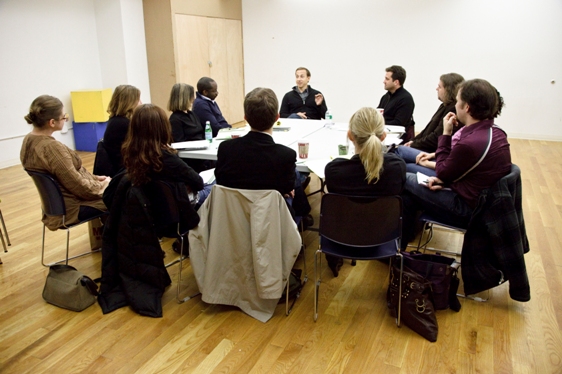Guest blog post by Primary Stages ESPA instructor Caridad Svich (2012 OBIE winner for Lifetime Achievement)
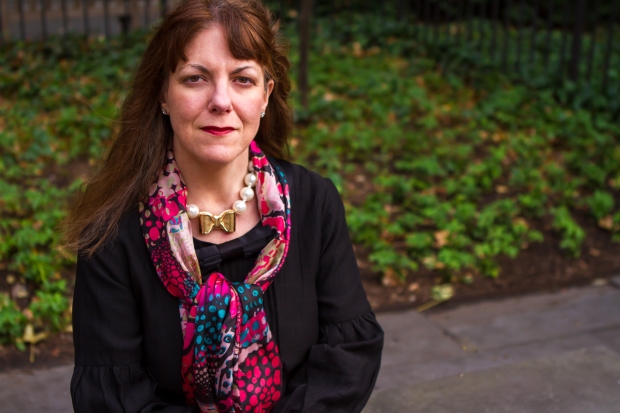
Caridad Svich. Photo by Jody Christopherson.
How do we live in crisis? How do we make art in times in crisis?
Both questions face us as writers when we confront the page in these times called end times, by some, and out of joint times by others. In the ancient days, when Sophocles and Euripides made their work, tragedies spoke corrosively to the heart of Greek societies rent by war. Performed by war veterans to an audience of veterans and their families, the plays some of us call the foundation upon which Western drama was built – Oedipus, The Oresteia, The Bacchae – were pieces that resonated in an immediate manner (by all reasonable historical conjecture of what spectatorship of theatre must have been like in ancient Greece) to the disorientating and disharmonious times in which most Athenian citizens lived or had experienced. One need only look at Aeschylus’ The Persians, the first Greek tragedy (472 BCE) of the 31 extant Greek tragedies that have survived, to witness a dramatic rendering of the fall-out of the Greco-Persian War told from the point of view of the defeated. Whilst scholars have debated whether Aeschylus’ deliberate focus on the Persians is meant to reinforce xenophobic feelings from an audience reveling, albeit battered, by Greece’s military victory, a close look at the play’s empathy with the lamenting Persians justifies a contrary point of view – namely that Aeschylus is asking his audience to put themselves in the Persians’ place, and reconsider the spiritual costs of war when a society has declared itself triumphant.
No winners here, one can almost hear Aeschylus saying. We are all complicit in this mess, for we too are the Persians.
Aeschylus’ act of radical empathy as a playwright and his challenge to his audience paves the way for increasingly demanding works in the tragic canon of ancient Greek drama – works that position the ethics of citizenship at the center of most of its stories, whether told from a more internal point of view, as in Euripides’ Medea or Sophocles’ Antigone, or from a choral perspective, as in Aeschylus’ The Libation-Bearers.
In times like these, times that are out of joint, tragedy and what it teaches us as a dramatic form may be our best hope of finding a way toward considerations of peace, reconciliation and forgiveness.
This last word sits on my tongue. Forgiveness. In some ways, its sound is soft and evanescent. The double “s” at the end of the word nearly fades as soon as one utters it. Yet, the word, for all of its seeming softness, is hard. And harder still when you face the page with the rage and despair effected by a world that feels increasingly fractioned by myriad issues, not the least of which are exponential economic inequity, and mercenary sectarian violence.
But Aeschylus and his fellow tragedians demand forgiveness from us, even when they show us narratives about figures that are blind in their ability to effect it. Greek drama is said to live suspended in the twinned axis of Apollonian and Dionysian desires. The radiating power of radical empathy and through it the courage to forgive the ones who attack and destroy, and the ones too that are on the receiving end of violence – physical, economic, and spiritual – allows citizen-spectators to reflect upon and perhaps embolden themselves toward acts of progressive transformation.
You may say, but why speak of tragedy now? The world is messed up, to put it mildly. What can a writer do or even hope to do in times such as these?
*
A couple of years ago, I decided I wanted to face the page in a new way (or maybe it was an old way that felt new to me). Regardless, I wanted to look at the poetics of the page in a manner that felt intimately connected to the heart-mind-body. In effect, I wanted to look at dramatic form as a container not necessarily for narrative and character (although I have nothing against either), but as shape – the shape of being. My overriding question for this dramatic project (one I am still on, by the way) was “How are we/I in the world?” How do we define a communal “we?” And what do we mean when we say “I?”
I suppose this central question seems unbearably simple, but I have found – play after play – that drawing a shape of being and doing so with clarity, purpose, and intention, not to mention, an awakened sense of grace, is much harder than it seems, because it has something to do – at root – with forgiveness.
That word again. With its double “s” folding into the corners of the mouth, sitting on the tongue, waiting to be welcomed into the body.
If drama is animated by conflict – by opposing forces battling it out or making love in an arena of desire witnessed by spectators immersed in a dance of wills that cast their semaphoric signs across space and time – it is ultimately called to deliver on how and where it sits in relationship to forgiveness, and its twinned reflector, radical empathy.
If drama – old-fashioned word, I know; much less favorable to use when “performance” is preferred – but, for now, let’s say drama, because, well, it actually means “action” in its noun form, and “to do and/or to act” in its verb form – demands of its citizen-spectators the creation of or the making way for the condition of the tragic to be held in time and space, and in body and mind, then it may just encourage at very least a consideration of our greater potentialities as human beings.
*
Ok. I admit. I tend to write out of creative outrage over what happens in the world – whether the “world” defined on the page is seen from a defiantly local lens or a panoramic, global perspective. Anger over ongoing and immediate social injustices does rather stoke my creative fire. In many ways, waking from the lethargy of the everyday and its petty concerns, is what often drives me to hunker down and actually put words to screen in the hope that there will be an audience somewhere someday that will wish to share in the experience of seeing/hearing/feeling an event in space.
I’m not idealistic enough to think a play can change the world – that any play can change the world. And while my colleague Lin Manuel-Miranda is carrying the burden (freeing and not) of representation on his shoulders right now, I know that Hamilton may change some things about the way some in the field may think about casting and who can tell whose story and what that means, but real change is not the deal. The deal is somewhere else. The deal is not even a deal, but rather a spirit-thing that cannot be quantified and measured with words like “social impact” and “effective outreach.”
What I’m saying is that the ontological process of examining being-ness goes beyond identifiable barometers of efficacy.
What I’m saying is that art may actually not be useful at all, despite the fact that in the immediate matter of things, there is the desire to measure its worth and value in economic and educational terms.
I think theatre’s great power may lie in its uselessness – as radical and Wildean as that may seem – even while it reflects in ways mimetic and not upon the ethics of citizenship, the rule of law, and how power is wielded in manners tyrannical and not.
Theatre is not the world.
Theatre is something else, somewhere else.
It may look and sound like the world sometimes, but really, it is its own thing.
And yet, paradoxically, it becomes the world because of the unbearable beauty of drama’s capacity to express a shape of being.
The I and we of theatre are in constant negotiation linguistically, corporeally, and sensorial – site to actor, actor to actor, actor to audience, text to space, and so on – to locate and dislocate. A sign is marked. A sign is erased. A sign lives in the ghosted space of theatre. Its meaning changes and shifts according to how it moves, and how it is received. Through unfixing planes of signified existence, it allows for new possibilities to be born out of the wreckage of solidity. The liquid and plastic nature of theatre make it urgent, dangerous and defiantly useless.
You can’t hold it in your hands, because it cannot be contained.
And even when you film it, something in theatre resists.
It is this resistance – this essential dissidence – that lies at the heart of making theatre.
It cannot be the world, because the world already exists.
It can only be other, alterna, defiant, marked by its refusal to be marked.
Untracing theatre, un-marking from its markings, is what every writer does, even while lines are drawn into the sand of the page’s canvas.
In so doing, the daily practice of enacting commonwealth – central to the making of drama – teaches us something time and again about what is possible through conflict resolution, and opens us toward a lightness of being we may not even know we possessed in the first place.
*
So, back to tragedy. What can tragedy teach us about who we are and who we might be?
The ancient Greeks in their extant plays show us time and again that the destabilizing space in which tragedy lives is the one where knowledge occurs. Rent asunder, we learn who we are, to what we have been blind, and how we may live again and/or teach our children to live.
Framed in light, witness the Persians crying for their loved ones and the loss of their country. Witness how Aeschylus cracks open the floor of grief to locate a different script, or maybe one that has been there all along – one that says hey, here we are, this script is neither mine or yours, but one that belongs to us all.
Caridad Svich received the 2012 OBIE for Lifetime Achievement. She is the author of over forty plays and translations. Her epic poem for theatre Sanctuary will be seen at Arena Stage’s Kogod Cradle Series in January 2016. She is editor of Innovation in Five Acts (TCG, 2015). She teaches playwriting at ESPA, and is a Lifetime Member of EST. Visit her at http://www.caridadsvich.com
To study playwriting with Caridad, join her for an Online Class at Primary Stages ESPA this Spring: Online Class: The First Draft or Online Class: The Rewrite.


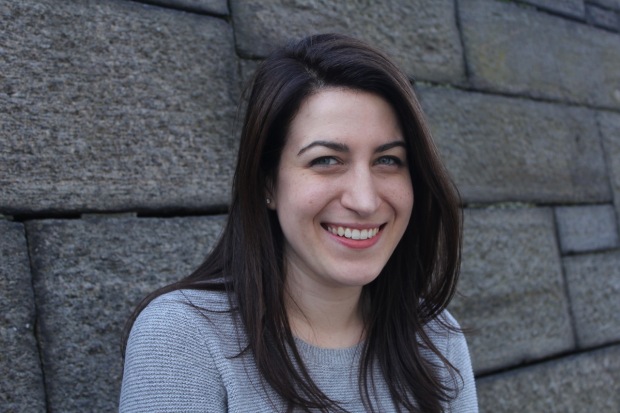

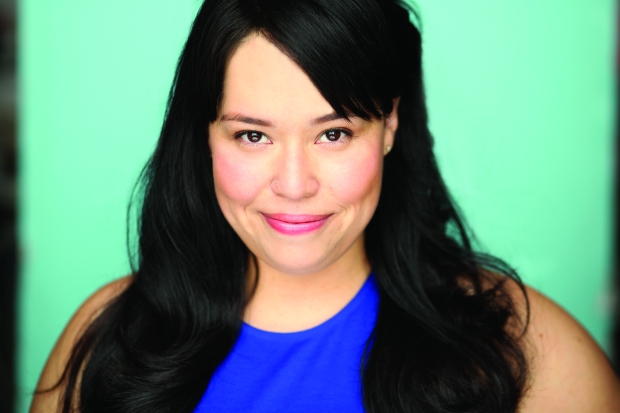 Vanessa Pereda-Felix moved to New York in 2009 from Central California. She ventured east with a BFA in theater and a dream to perform in New York. After three years in the city, she longed for a community of artists and the opportunity to hone her craft. She found that home at Primary Stages ESPA.
Vanessa Pereda-Felix moved to New York in 2009 from Central California. She ventured east with a BFA in theater and a dream to perform in New York. After three years in the city, she longed for a community of artists and the opportunity to hone her craft. She found that home at Primary Stages ESPA.
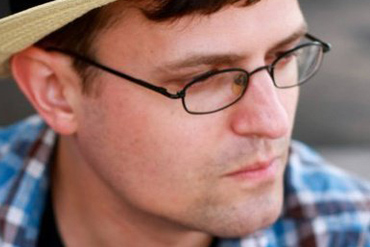
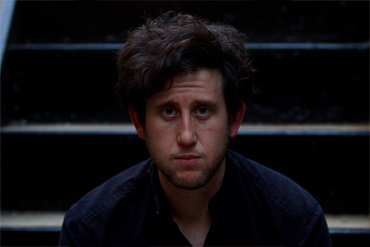


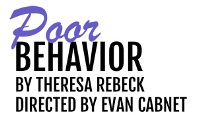
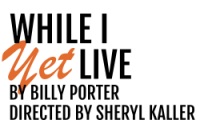 Our first show, the New York premiere of Theresa Rebeck’s new comedy,
Our first show, the New York premiere of Theresa Rebeck’s new comedy, 
